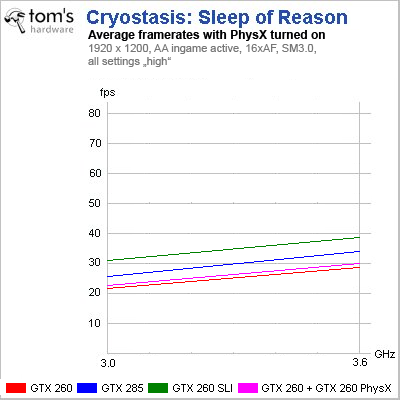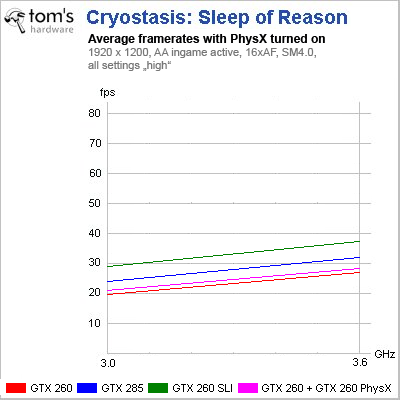Cryostasis: From Russia, With An Appetite For Fast Hardware
Hardware Test: Can A High-End PC Achieve A Performance Break-Through?
In these tests, the Gaming PC 2 and Gaming PC 3 come into play. Based on an overclocked Intel Core 2 Quad 6600 and an AMD Phenom II X4 940 BE, with clock rates at 3.0 GHz and 3.6 GHz, we tested the two platforms with GeForce GTX 260 and GTX 285 graphics cards. In addition, we also tested two GeForce GTX cards on the AMD system, both in SLI and in dual, independent card configurations, both for graphics output and PhysX acceleration. All graphics settings were either turned on (where no value settings were available) or set to their highest levels. The test runs were further separated to compare Shader Model 3.0 and 4.0.
Intel Versus AMD
From the get-go, the difference between the two CPUs was unmistakable. At the same clock rates, our old and overclocked Intel quad-core outperformed the AMD Phenom II, whether at 3.0 GHz or at 3.6 GHz. The performance boost going from 3.0 to 3.6 GHz had an obvious impact on the minimal frame rates. Although the average frame rate also climbed, it didn’t improve as much as the minimum values. Because both systems delivered more or less identical results, we also decided to perform some more tests on the AMD system (Gaming PC 3) to observe the impact of SLI. Here, we have to give AMD a significant nod for its Phenom II X4, because its older dual cores painted a much bleaker picture.
Quad-Core Versus Dual-Core
We compared our first set of benchmarks, taken with two cores deactivated, against another set taken with all four cores turned on. This led to the somewhat sheepish realization that this game does not benefit much from the addition of additional processing cores. What doesn’t work with two cores, still doesn’t work with four cores, either. This is too bad, because the PhysX calculation on the CPU could have benefited from this scenario.
Benchmarks: High Settings
Next, we focused on high graphics settings with PhysX and Shader Model 3.0.
Get Tom's Hardware's best news and in-depth reviews, straight to your inbox.
…and then, with Shader Model 4.0.
Results:
- For Shader Model 3.0, frame rates are slightly higher than they are for 4.0
- Frame rates scale well above 3.0 GHz as clock rates climb, for both processors
- SLI confers somewhat higher frame rates, but doesn’t scale well for this game
- The combination of a graphics card for rendering plus a second card for the PhysX accelerator doesn’t do much
- As before, the CPU remains the measure of all things for this game.
Playability
On any of these configurations at high settings and with all four tested graphics cards, game play is fluid throughout. But not everybody has a PC that belongs to this performance class. This puts the game into a two-class model (the haves and the have-nots). We can only hope a future patch might remedy the situation.
Eye Candy
The visible differences between these settings and their mid-range counterparts are not terribly striking, as you have to look carefully to see any improvements. That said, shadows and steam look much more natural at first glance. Even here, hardware investments and results don’t seem to show a meaningful relationship. By comparison to FEAR 2: Project Origin, the benefits are very noticeable.
Current page: Hardware Test: Can A High-End PC Achieve A Performance Break-Through?
Prev Page Hardware Test: Mid-Range PCs Next Page Graphics Tips For Cryostasis And ConclusionTom's Hardware is the leading destination for hardcore computer enthusiasts. We cover everything from processors to 3D printers, single-board computers, SSDs and high-end gaming rigs, empowering readers to make the most of the tech they love, keep up on the latest developments and buy the right gear. Our staff has more than 100 years of combined experience covering news, solving tech problems and reviewing components and systems.
-
truehighroller I heard this game was messy. I recently purchased Prototype though and it is a good game...Reply -
werr20 i played this game and it's nice ! i have x3 720be(2,8ghz),4gb ram ddr2, 4850 512mb .on my pc it runs smoothReply -
anamaniac Penttium D 2.8GHz, 1gb ddr2 533, ATi 4670 (underclocked to hell because of computer stability recently).Reply
I took the game all not too bad.
Looks and sounds amazing.
However, it couldn't really catch my attention long enough to develop an interest to delve even 30 minutes into the game. -
darkpower45 soooo when did toms start to do game reviews? just a thought. The game looks pretty good though. The good think about the review is that it showed the performance on the low end systems. Good review even if its a game not hardware.Reply -
curnel_D I'll be honest, I really didnt like the way the benchmark sections were done. Not because of poor information, but because of poor management of that information. At 3 in the morning, it's hard to figure out what's going on.Reply
On the flip side, I do like the game reviews lately. Perhaps we can see a resurection of Toms Games, and perhaps even the illustrious Second Take? :D -
You managed to benchmark with Nvidia cards exclusively, you keep reminding me why I almost never visit this site any more.Reply
-
Andraxxus If you have a good PC it might be an enjoyable experience but if you don't have one then stay away. I could not even run it but i've seen in on a good PC and it looks and sounds good.Reply -
falchard I would like to see a game developer say. Screw nVidia, they keep holding back progress and use their developers network as a method to retain a user base. I am going to make a game that completely takes advantage of ATI hardware. From multi-processing units, to tesselation and ray tracing.Reply -
Onus I think they mostly used nVidia because of PhysX, at least that was my take on it. They did use some ATI cards too.Reply
Although this is not my kind of game, the review was written in a manner that I thought gave good information on how it might run on my system.
I'd like to see Second Take return as well, even though I don't recall it addressing hardware requirements the way this review did.
-
marraco Is fantasy, not science fiction.Reply
I played the game entirely, and I don't recommend it until a much needed patch is available.
The game really gets no benefit from PhysX (I buyed the game hoping to play a game physx capable).
And the performance is really poor. I was forced to play it on 1024x768, without any antialiasing, on a Geforce 8800 GT oc, and still got lots of glitches, and bad framerates.
The sound frequently ruined itself completely, and sometimes crashed.
Sometimes you get stuck on places, and finds yourself incapable of progressing. Then reload an older saved game, and finds that you got stuck because of a bug, instead a by design game. Sometimes a tube bends too vertically, and you cannot escape a room, or fix it.
The savegame system is broken. Sometimes you save a game, but are unable to reload it, or reload it and after a looong reload time, just finds that the small screenshot and filename does not match what was showed, and you loaded another file.
Although the game introduces some welcomed original innovations (common First Person Shooters are getting really repetitive lately), all the bugs it have make playing it a really painful experience. I had good hardware, but my experience was poor, and was no exception. I found lots of people with the same problems on internet (although others had slower hardware than me, and got no problems).
I strongly recommend to wait for a patch to be released, before acquiring the game.
After it, I played FEAR 2. It was so much optimized software, and played so smoothly, even on max settings, that I really enjoyed it.


